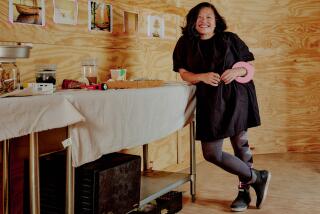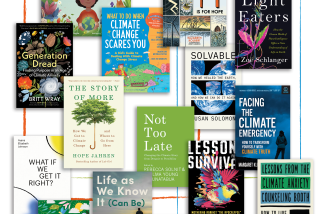‘Eating Animals’ by Jonathan Safran Foer
Eating Animals
Jonathan Safran Foer
Little, Brown: 340 pp., $25.99
Looking forward to your turkey dinner? Think twice. It’s time, argues Jonathan Safran Foer, to stop lying to ourselves. With all the studies on animal agriculture, pollution, toxic chemicals in factory-farmed animals and exposés of the appalling cruelty to animals in that industry, he writes in “Eating Animals,” “We can’t plead ignorance, only indifference. Those alive today are the generations that came to know better. We have the burden and the opportunity of living in the moment when the critique of factory farming broke into the popular consciousness. We are the ones of whom it will be fairly asked, ‘What did you do when you learned the truth about eating animals?’ ”
Some of our finest journalists (Michael Pollan, Eric Schlosser) and animal rights activists (Peter Singer, Temple Grandin) -- not to mention Gandhi, Jesus, Pythagoras, Aristotle, Thomas Aquinas, John Locke and Immanuel Kant (and so many others) -- have hurled themselves against the question of eating meat and the moral issues inherent in killing animals for food. Foer, 32, in this, his first work of nonfiction, intrepidly joins their ranks, inspired by fatherhood, the memory of his grandmother (who survived the Holocaust by scavenging her way to freedom) and something else.
This something else is what made critics of Foer’s fiction, the novels “Everything Is Illuminated” (2002) and “Extremely Loud and Incredibly Close” (2005), fall over themselves to praise him. It is a kind of fearless modernity: one part “whatever,” one part descendant of Holocaust survivor (we’ve only got this one life, if that, to get things right) and one part soaringly beautiful, annoyingly entitled liberalism. What did you do when you learned the truth about eating animals? There’s no hiding behind culture in Foer’s postwar, post- 9/11, square-framed modernism: “Food is not rational. Food is culture, habit, and identity. For some, that irrationality leads to a kind of resignation.” Think your way through it, Foer warns. Define the terms. Choose your priorities. You have that luxury.
You have that luxury because doctors and health advocates agree that vegetarianism is more than adequate (many say more healthful) than a meat-eating diet, especially meat tainted with toxic pesticides, hormones and other chemicals. You have that luxury because so many foods are now available. You have that luxury because there is now so much information on how to live and care for your loved ones without supporting animal agriculture and factory farming.
That said, this book, its author warns, is not a case for vegetarianism. It’s a case for being informed and taking responsibility. In the process of asking questions, Foer “came face-to-face with realities that as a citizen I couldn’t ignore, and as a writer I couldn’t keep to myself.”
After a brief, Swiftian modest proposal on our relationship to animals (including a “classic Filipino recipe” for stewed dog), Foer launches into the various sectors of the animal agriculture industry: chickens, fish, pigs and cattle. Some sections are so overwhelmingly violent as to be unreadable. Many readers, especially readers of the work of Grandin, a designer of livestock handling facilities and author of several fascinating, enduring, groundbreaking books on autism and animal rights, will have read passages like this before. For those who haven’t, especially those who eat meat, the feeling is not unlike gagging, like being the poor sop in a horrible Greek fable who has just unknowingly eaten his family members.
Even, for example, if you thought you were right in buying free-range chickens, you can stop patting yourself on the back. “To be considered free-range, chickens raised for meat must have ‘access to outdoors,’ which, if you take those words literally, means nothing. Imagine a shed containing thirty-thousand chickens, with a small door at one end that opens to a five-by-five dirt patch -- and the door is closed all but occasionally.”
A reader is reminded of the debate over the first photographs from the Vietnam War. We don’t want to look. Should we or shouldn’t we?
Can one person make a difference? Certainly, he writes. Our food choices matter: “We eat as sons and daughters, as families, as communities, as generations, as nations, and increasingly as a globe. We can’t stop our eating from radiating influence even if we want to.” Or else he says: “Cruel and destructive food products should be illegal.” These are Foer’s conclusions.
You might not like being lectured on this topic, and Foer is not a philosopher or a logician -- so his arguments now and then veer into the shrill zone. For some readers, this will be the final straw, the book that finally makes you forgo the Thanksgiving turkey in favor of 10,000 other available dishes. Oddly, the strongest parts of the book are those in which Foer recalls his grandmother, for whom hoarding food was a vestigial effect of the war. “ ‘The worst it got was near the end,’ ” she recalls, “ ‘and I didn’t know if I could make it another day. A farmer, a Russian, God bless him, he saw my condition, and he went into his house and came out with a piece of meat for me.’ ”
“ ‘He saved your life.’
“ ‘I didn’t eat it.’
“ ‘You didn’t eat it?’
“ ‘It was pork. I wouldn’t eat pork.’
“ ‘Why?’
“ ‘What do you mean why?’
“ ‘What, because it wasn’t kosher?’
“ ‘Of course.’
“ ‘But not even to save your life?’
“ ‘If nothing matters, there’s nothing to save.’ ”
This is the kind of wisdom Foer hopes to pass on. It is the kind of wisdom that, in all its humanity and clarity, deserves a place at the table with our greatest philosophers.
Salter Reynolds is a Times staff writer.
More to Read
The biggest entertainment stories
Get our big stories about Hollywood, film, television, music, arts, culture and more right in your inbox as soon as they publish.
You may occasionally receive promotional content from the Los Angeles Times.










